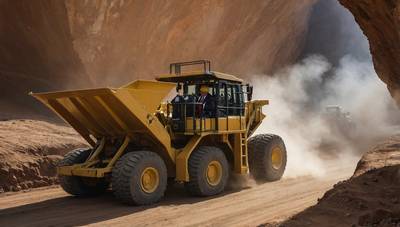Trump or BRICS? Russell: The dilemma for Africa's miner and government:
The world is likely to be splitting in two over the long-term, despite the volatility and uncertainty caused by President Donald Trump's tariffs.
After removing Trump's bluster, and his often contradictory behavior, the message appears to be pretty clear. Trump's worldview is that the United States are the only ones who can be trusted.
This presents a problem for the mineral-rich countries of Africa, who want to maximize their benefits from their resources but also remain neutral.
It's becoming more likely that African countries will be forced to choose whether they want to work with China-led BRICS or the Trump camp.
Both scenarios have their risks and rewards, and the specific circumstances of each African nation may lead to a particular outcome.
The Investing in African Mining Conference, which took place in Cape Town this week, was largely a discussion about the best way forward for African miners and governments.
Minerals are already abundant on the continent, but its untapped reserves will be the prize of the future, especially if energy transitions accelerate.
Africa has a rich resource base, estimated at 20% of the global reserves of copper, and about the same amount of manganese, cobalt and platinum group metals. It also contains 36% chromium and reserves of gold, lithium, uranium and rare earths.
The development of its mineral resources is often difficult due to political instability, corruption, poor infrastructure and lack of capital.
The increasing demand for minerals in the world, particularly to support the energy transition is likely to spark a new race for Africa. This time, Africans will be able to have a greater say on how the situation unfolds.
African countries face a challenge in finding the right partners.
The West still has a lot to offer, including deep capital reserves and sophisticated equity markets as well as investors with skills and experience in mining.
Trump undermines these advantages by threatening to withhold funding and aid, and his flip-flopping policy and habit of turning against traditional allies.
Trump's main problem is that he has an apparent transactional worldview, where there must be always a winner and loser. He always wants to win.
It will be harder to get a deal with the United States that is mutually beneficial while Trump is president.
Not Beggars
Gwede Mantashe, South Africa's Minister of Resources, said that Africa should not sell minerals to the United States if Trump reduces aid.
If they don't want to give us money then let's stop giving them minerals. Mantashe said at the Mining Indaba conference that we are not beggars.
Mantashe stated that "we cannot continue to discuss these minerals on the basis of the dictates from some developed nations, as if we had no aspirations for Africa to industrialise and close its development deficit."
The comments made by Trump may have been unwise, as they could serve to annoy him. However, they might also help the West to think about how to best access Africa's mineral resources.
What is the best way for Africa to tap into its mineral wealth if it looks more towards China and other BRICS countries?
It has been a mixed experience. China is willing to invest in mines in Africa. However, they prefer to use their own processes and people to do so. They also want to export the raw ore and beneficiate it in China.
The benefits of this arrangement have been limited for African countries. However, it may be possible to adopt legislation similar to that in Indonesia to force companies to engage in domestic downstream operations to gain access to raw materials.
These are the views of the columnist, who is also an author. (Editing by Kim Coghill).
(source: Reuters)





